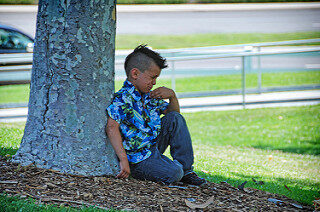When you look up what Autistic people have said about how to help us through meltdowns, the most foundational piece of advice you will see again and again is to remain calm. But what about when you can’t remain calm? What about when that Autistic person’s meltdown is triggering your own trauma response?
Tag: meltdowns
Retreat isn’t just a quiet room, it is an explicitly neurodivergent space. Nothing about us without us, right? It’s a place to stim freely, drop the mask a little, and find some neurodivergent kinfolk.
Photo © Tony Cheng | Flickr / Creative Commons [image: Blue medical mask painted with a toothy, red-lipped smile.] Content note: Discussion of self-injury, self-harm, and aggression. —- Of all the varied stress bombs COVID-19 has lobbed at autistic people and their families, one of the more universal is the stress caused by routine disruption, coupled with constant close quarters. Few of us are at our best under such circumstances, so we wanted to share some advice and insights from autistic people and/or parents who are experiencing what you are experiencing about handling some of the tougher aspects, like increased tendencies towards self-injury and aggression. We also want to direct people towards our existing resources: Autistic Insights on Meltdowns, Aggression, and Self-Injury Understanding Autism, Aggression, and Self-Injury: Medical Approaches and Best Support Practices Behaviour Analysis, The Autistic Way Eleven Ways You Can Make Your Autistic Child’s Life Easier First, we…
There are far too many examples of autistic people being arrested or sectioned, let alone reprimanded or ostracised, for having a meltdown—a reaction to difficulty and stress that is normal to our way of being, but not nearly well enough understood by others.
It’s important to remember that when an autistic person is struggling or having aggression, they are not being “bad” or trying to do something to you personally—even though it can feel like that, especially if they’re screaming at you or making you angry.
When you help me cope with a meltdown and when you help create an environment that helps me avoid meltdowns, you are helping to build a kinder, gentler world that has room for everyone, no matter what kind of nervous system they have.
Holly Robinson Peete | Photo: Gatepath [image: Candid photo of actress & author Holly Robinson Peete] Actress, author, and philanthropist Holly Robinson Peete spoke at a Gatepath event near San Francisco last week. She talked about her new book Same But Different: Teen Life on the Autism Express, which she co-wrote with her autistic son RJ and his non-autistic twin sister Ryan, about understanding and including autistic people, about supporting autistic kids with high support needs who don’t have the resources her family does, and why “We need to spread the word about how neurodiversity is another form of diversity.” TPGA’s Shannon Rosa talked with Holly after the event, which was nifty because Shannon worked with the HollyRod foundation during the earliest part of the iPads for Autism movement, including developing a spreadsheet of recommended autism apps, had interviewed Holly, and had featured her writing here on TPGA — but…
Prather Harrell www.africanamericanautismofaz.org No, not my autistic five year old son … I’m the one on the verge of a meltdown! It was one of those days where I could not seem to make anyone happy. Jonah, my five year old, had been having a bad summer all along. I can’t say that I blame him. Here we go changing his schedule around from KinderPrep (ABA/habilitation) in the mornings and public preschool in the afternoons with a few therapies sprinkled in between, to therapies in the morning and KinderPrep in the afternoon and no more Mrs. Marsha period (his preschool teacher – Jonah completed preschool this spring and will be headed to Kindergarten this fall). The teachers changed, the students changed, some of his therapists changed — we flipped his entire schedule around and no one ever consulted him about it. I guess I’d be pretty pissed too if somebody…
Judy Endow, MSW www.asperger.net www.makinglemonadestore.com Meltdown behavior is quite common for those with Autism Spectrum Disorders. And, indeed, the most frequently asked question by parents and educators is: “What do I do when my child has meltdowns?” When the meltdown is occurring, the best reaction is to ensure the safety of all concerned. Know that explosive behavior is not planned but instead is most often caused by subtle and perplexing triggers. When the behavior happens, everyone in its path feels pain, especially the child. Stages of Explosive Behavior So, what exactly is explosive behavior? In my book Outsmarting Explosive Behavior: A Visual System of Support and Intervention for Individuals with Autism Spectrum Disorders (Endow, 2009), explosive behavior is defined as having four distinct stages, followed by a clearly defined recovery period. In addition, the physiological fight/flight mechanism is triggered immediately prior to the explosion. In this model, the four stages…






